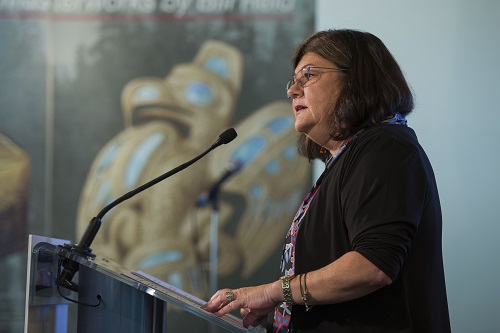The Overdose Crisis:
We can help impacted people by supporting and understanding, not judging

A message from Dr. Shannon McDonald, Deputy Chief Medical Officer
International Overdose Awareness Day is a global event held on August 31 each year to raise awareness of the tragic losses due to overdose – specifically, to reflect on what each of us can do to help reduce the number of people experiencing overdose in our areas of the world. This day also acknowledges the grief felt by the many people who have lost loved ones to overdose.
In BC, First Nations people have been disproportionately affected by overdose events and overdose deaths. A joint report from the BC Coroners Service and the FNHA released last summer found that First Nations people were five times more likely to experience an overdose, and three times more likely to die from one.
As an Indigenous physician, I am deeply concerned about these tragic statistics, and would like to share with everyone two very important messages: 1) overdose events and deaths are preventable, and 2) we can all play a part in the prevention of overdose events and deaths.
How can we help prevent overdose events and deaths?
At the First Nations Health Authority (FNHA), we believe that people who struggle with addictions need our support, not our judgment. As a First Nations health organization, we recognize that the root causes of problematic substance use stem from experiences shared by many of our people, including traumatic disconnection from families, communities, lands and cultures that has left a legacy of intergenerational pain. We also recognize that the cure for this trauma of disconnection is reconnection, and that "connection is the opposite of addiction." Experts in treating addiction like Dr. Gabor Mate, who has done extensive work with people in the Downtown East Side of Vancouver, emphasize that if people do not find connection in their lives with other people, they will find something to connect to – including substances.
We have learned that stigmatizing drug use can actually contribute to more deaths, as people experiencing shame may isolate themselves and become more reluctant to discuss their challenges with addictions or to seek medical help. So, one way to help save lives is to have a non-judgmental attitude towards problematic substance use and drug addiction. The bottom line is that the people in our lives who struggle with addictions need to feel that they are safe with us and that their lives are valued.
In health care and social services, this people-positive and prevention-oriented perspective is known as a "harm-reduction approach." Of course, in the long term we would all want every community to be drug-free. But realistically, a harm-reduction approach is necessary to save lives in the short term – the here and now.
At its core, harm-reduction approaches acknowledge that every person deserves to be treated with dignity, kindness, respect and compassion. It is a non-judgmental approach that allows for self-determination and choice, which helps us to be a better partner with people on their healing journey. This approach seeks to reduce the harms associated with drug use by providing factual education about drug use, drug-related illness and injury prevention, and to offer supportive care, and supplies for safer drug use including safe injection sites. Where acceptable to the individual, effective drug treatments and other necessary health care services can be offered and made available. Please check out our short videos on the subject at
https://www.youtube.com/user/fnhealthcouncil/videos.
In the bigger picture, we can view harm-reduction approaches as part of our reconciliation work in that they play a role in healing the long-term trauma affecting our peoples. Harm-reduction approaches are also directly tied to our cultural safety and humility work in that they align with trauma-informed approaches to care, a crucial aspect of mental health and wellness support for First Nations people. These approaches are focused on learning and talking about how to keep ourselves, our families and friends safe, rather than on judging. We understand drug use as a health issue rather than a moral issue.
As a physician, I've learned that abstinence from drug use is not the only path to healing, and it does not work for everyone. The abstinence model often places responsibility on the individual alone. As anyone who struggles with addiction will tell you, addiction isn't a choice you make, and shame and blame do little to help those who need support.
Simply put, we have learned that providing harm-reduction supplies is a practical way of caring. We believe it enables safety, reduces illness and injury, and maintains or improves the health status of people using substances.
Let’s stop judging or shaming people who use substances — let’s support, understand and take care of each other instead.
Yours in Wellness,
Dr. Shannon McDonald

